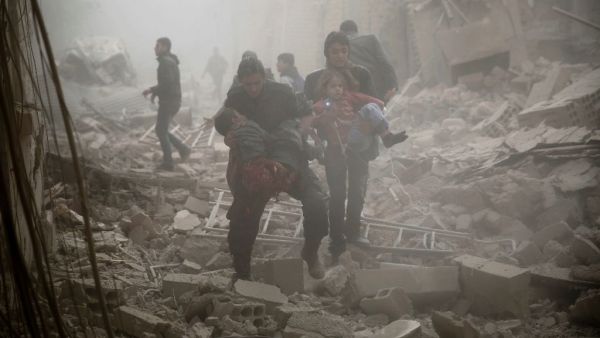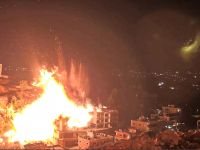It was the attack that shook the world. Three years ago today, over 1,000 people (mainly women and children) were killed in Syria’s Ghouta province when the deadly chemical agent sarin was dropped on rebel-held suburbs.
It seemed to be the event that would change the course of Syria’s war, riling up the international community and spurring the US and allied nations towards the brink of intervention.
Popular Western and Syrian opposition belief was that Syrian forces loyal to President Bashar al-Assad were responsible for the attacks. On the other side, Syrian and Russian forces placed the blame on opposition groups.
In between the toing and froing of international bureaucracy, the international community backed down. The citizens of Ghouta remain under siege, with no access to food supplies or medical facilities and under constant bombardment from Syrian and Russian airstrikes.
On the three-year anniversary of the attack, #chemicalmassacre has began trending on Arabic social media, as people took to Twitter to remember the horror of the attack and condemn the lack of international response.
يومها كنت في الريف الغربي لدمشق لن أنسى ذلك اليوم لن أنسى وجوه الناس و نظراتهم كانت صدمة كبيرة عم الصمت القلوب بلغت الحناجر #مجزرة_الكيماوي
— مصطفى معتوق (@OmarAo584) August 21, 2016
I was at the west of Rif Dimashq Governorate that day. I will never forget that day, will never forget the faces of people and the look in their eyes, it was a great shock, silence was everywhere, hearts were in throats.
#مجزره_الكيماوي
المجرم مازال حر طليق
والعالم يشاهد أجرامه ويصفق— الاعلامي رائد الحموي (@raaadold) August 21, 2016
Criminal is still free. The world is still watching his crimes and clapping for it.
#مجزرة_الكيماوي
— يوسف البستاني (@YousefAlbostany) August 21, 2016
قهر الرجال,أب يبكي أطفاله الذين قضو خنقً بغاز السارين#assad_chemicals #كيماوي_الأسد#الغوطة_الشرقية pic.twitter.com/z67ypPsqcU
The oppression of men, a father cries his children that were killed by sarin gas.
في مثل هذا اليوم
— Amnah ali (@feisal_amnah) August 21, 2016
في مثل هذه الساعات
أطفال ناموا ولم يستيقظوا
نعم أنه الكيماوي الذي انهى ضحكاتهم#مجزرة_الكيماوي pic.twitter.com/ArnFnZM8YZ
On a day like this
In hours like these
Children slept and did not wake up
Yes, it is the chemical that ended their laughs
The bloody anniversary brings to light the reoccuring question, how can the international community effectively respond to the Syrian conflict? As the deathtoll steadily rises, it is a question that remains to be answered.
AM







